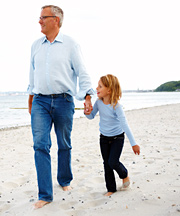Boost Bone Health Osteoporosis is characterized by low bone mass, which increases the risk of fractures. As we age, a fracture, particularly a hip fracture, can be devastating, limiting mobility and your ability to function. Isabelle Dionne, from the University of Sherbrooke (Canada) and colleagues studied 34 postmenopausal women, average age 66.1 years, with an average body mass index (BMI) of nearly 26, assigning them to one of four groups for a period of six months: no exercise and no antioxidant supplement; no exercise and antioxidant supplement (600 mg vitamin E and 1,000 mg vitamin C daily); exercise (resistance training) and no antioxidant; and exercise plus antioxidant. In women who did no exercise and took no antioxidant supplement, a significant loss of bone in the hip and spine was recorded during the study period, while in the exercise and antioxidant supplement group, the researchers found the best bone mass retention over the study period.
A Little Goes a Long Way
Another study suggests people who stay even moderately fit as they age may live longer than those who are out of shape. A study by Sandra Mandic, from the University of Otago (New Zealand), and colleagues studied 4,384 middle-aged and older adults (whose fitness levels were assessed via exercise treadmill tests between 1986 and 2006), and then tracked them for nine years. When the researchers separated the participants into five groups based on fitness levels, they found that one-quarter of the least-fit men and women had died during the study period, compared to only 13 percent of those who were slightly more in shape. Among adults in the most-fit group, only 6 percent died during the follow-up period.
Overall, the five groups showed little difference in their reported exercise habits during their adult lives, but there were marked differences in physical activity levels in recent years. The team urges that "Since it is recent physical activity that offers protection, it is important to maintain regular physical activity through life."
Don't Stress Out
 By the way, research suggests psychological stress leads to weight gain, which certainly won't help you stay active or healthy as you age. A study conducted by Jason Block, from Harvard Medical School, and colleagues. The study tracked 1,355 men and women, ages 25 to 74, from 1995 to 2004. For women, who generally experience higher levels of baseline psychosocial stress in several areas, waistlines were affected by job-related demands, perceived constraints in life, strain in family relations, and difficulties paying bills. For men, lack of decision authority at work and difficulty in learning new skills were associated with greater weight gain. The researchers suggest that the connection between increased stress and weight gain may be hormonal, perhaps due to elevated levels of cortisol (the stress hormone) or the interplay between glucocorticoids with ghrelin and leptin, two hormones that factor into appetite.
By the way, research suggests psychological stress leads to weight gain, which certainly won't help you stay active or healthy as you age. A study conducted by Jason Block, from Harvard Medical School, and colleagues. The study tracked 1,355 men and women, ages 25 to 74, from 1995 to 2004. For women, who generally experience higher levels of baseline psychosocial stress in several areas, waistlines were affected by job-related demands, perceived constraints in life, strain in family relations, and difficulties paying bills. For men, lack of decision authority at work and difficulty in learning new skills were associated with greater weight gain. The researchers suggest that the connection between increased stress and weight gain may be hormonal, perhaps due to elevated levels of cortisol (the stress hormone) or the interplay between glucocorticoids with ghrelin and leptin, two hormones that factor into appetite.
It's been estimated that as few as one-third of Americans age 50 and older get any regular exercise, even though from a longevity standpoint, it's absolutely crucial to participate in consistent physical activity - as these and countless other research studies show. So, what are you doing to stay active? Talk to your doctor about the many benefits of consistent physical activity and work together to design an exercise program that works for you and of course, takes into account any pre-existing health conditions that may limit the type or intensity of exercise you can tolerate.
Ronald Klatz, MD, is the president of the American Academy of Anti-Aging (www.worldhealth.net), a nonprofit organization dedicated to the prevention, detection and treatment of aging-related disease.
Robert Goldman, MD, is the chairman of the American Academy of Anti-Aging (www.worldhealth.net), a nonprofit organization dedicated to the prevention, detection and treatment of aging-related disease.

